Monthly Roundup, December 2014
By majormitch 0 Comments
Man, what a month. School was as busy as ever for the first half of December, leaving me precious little time to play video games. Then for the second half I had a holiday break, which I took advantage of to plow through as many games as I could. This resulted in a whirlwind of Bayonetta 2, Middle-earth: Shadow of Mordor, The Fall, and Far Cry 4; I played through all four games in their entirety in a roughly two week span. Part of that rushed playthrough was wanting to make sure I considered them for my top 10 list for 2014, but really, I know that once school starts back up I wouldn’t have time for them for quite a while. If I didn’t play them now, it would be a long time before I got to them, so I took advantage of the opportunity while it was there. It made for quite a bang to end the year too.
I’m going to structure this blog slightly differently this month as well. Once I started writing I realized that the game I had by far the most to say about was Middle-earth: Shadow of Mordor. To avoid this blog becoming a damn novel, I’m relegating everything but Shadow of Mordor to a few sentences via bullet points. I feel I can say what I really need to about those games in a quick overview, which frees up space to deep-dive into Shadow of Mordor. I recently declared it my favorite game of 2014 after all, and I haven’t had a chance to go into why I like it so much yet. This is the time to do that, and hopefully someone finds it a fun read. Be warned: it’s a lengthy one.
Things That Are Not Middle-earth: Shadow of Mordor
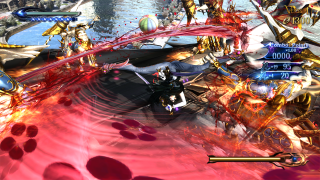
- I finally wrapped up what I wanted to do in Theatrhythm Final Fantasy: Curtain Call at the start of the month. There wasn’t much left, but it’s nice to get some closure to what’s turned out to be a wonderful rhythm game that I played a lot of in recent months. I’m sure I’ll pick Curtain Call back up and jam through some favorites here and there, but the heavy lifting is done.
- Velocity 2X was the only other game I spent any time with during the first half of the month, and I’ve worked my way through most of the game at this point. Like its predecessor, I enjoy Velocity 2X on the whole, but it’s a fairly simple game that I never find myself wanting to play more than a few levels at a time. It’s taken me most of the month to slowly work through it, but I only have a few levels left to polish off in January.
- Bayonetta 2 was the first of my big holiday jams, and I really dug it. I had a high appreciation for the original Bayonetta’s ridiculously over-the-top nature, and also enjoyed its combat. Bayonetta 2 is essentially more of the same, which isn’t bad by any means, but if you played the first then you know what to expect. Based on my memory, I do think the combat is slightly tighter this time around, even if Bayonetta 2 isn’t quite as entertainingly insane as the original on the whole. Either way, I had a fun time with this spunky action game.
- I also played through The Fall during break, which isn’t a long game by any measure. In most ways it’s a pretty typical adventure game, but it succeeds due to its strong art style and sharp writing. The puzzles often boiled down to “try using every item on everything” for me, which could be annoying, and the combat wasn’t that great. But I liked the narrative aspects more than enough to carry me through, and am curious what the future holds for The Fall.
- As I did in 2013 with Earthbound, I spent the final hours of 2014 finishing a video game; this year it was Far Cry 4 that I wrapped up an hour before midnight. While Far Cry 4 is certainly “more Far Cry 3”, this is a formula that hasn’t worn out its welcome just yet (much like Bayonetta 2 in that regard). In fact, I think Far Cry 4 is slightly more polished than Far Cry 3 in some subtle ways that led to me liking it slightly more. I think most of the side activities are better, the story is more coherent, and by extension the main missions weren’t as much of a drag. Still, the best part of Far Cry 4 very much remains the open world mayhem you can get into, and this game delivers that in spades. I had a blast with it.
Middle-earth: Shadow of Mordor
The main game I wanted to tackle during my holiday break was Middle-earth: Shadow of Mordor, and boy did I ever accomplish that. Knowing I was operating on a tight time frame for the ambitious goals I set for myself during break (on top of my other duties), I blitzed through Shadow of Mordor in just under four days, with a 100% completion rate at that. I’m often the first to scoff at open world action games; I’ve never bought in to Rockstar’s ever popular style, and I fully abandoned Assassin’s Creed after I didn’t like the second game. But I knew I had to at least give Shadow of Mordor a shot, despite its obvious similarities to genre stalwarts. That nemesis system sounded pretty rad, and the word was that Shadow of Mordor played much better than its competition. After playing it for myself, I fully agree with that assessment, but that also doesn’t get to the heart of why this is such a good game. In fact, Shadow of Mordor has me doing a complete 180 on the potential of open world action games, and is my favorite such game in a long, long time… if not ever.
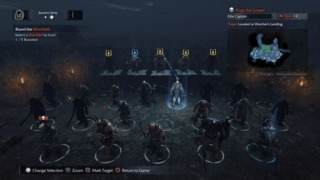
I’ve never disliked the underlying concept of open world games, and I’ve liked entries just fine on the rare occasion where they control well enough and/or have some interesting activities to engage in; Infamous and Far Cry are good examples. But the main conceit of open world games -- the fact that you are in an “open” world where you can go “anywhere” and do “anything” -- has rarely felt justified to me. Most open world games tout their open worlds as big features, only to go on and make missions that take place in limited, quarantined areas. The open world serves merely as a hub area between missions, a dumping ground for collectibles, or in the worst instances, an obstacle between you and the next objective marker. While Shadow of Mordor’s world does serve some of those ancillary functions, the nemesis system adds a new dimension to the entire thing. The hierarchy of orcs you can interact with are dynamically scattered all around the map, and to locate the orc leaders you need to interrogate regular orcs and uncover intel. Furthermore, each leader has their own set of strengths and weaknesses, as well as some amount of personality (and badass/hilarious name). Identifying those strengths and weaknesses is a key part of successfully toppling them, and the whole process had me feeling like I was invading the enemies’ territory and hunting them down. To top it all off, as the game progresses you get the ability to “brand” orcs and make them fight for you. This adds another thick layer to proceedings, where you can have orcs you control infiltrate a warchief’s personal bodyguard, or just plain fight each other. There are also “nemesis missions” that show up from time to time, where you can help an orc gain followers, help settle an orc duel, invade a celebratory feast, and plenty more. Oh, and did I mention that if an orc kills you, they get promoted and grow stronger? You have a surprising amount of influence on the orc’s hierarchy in all sorts of ways, making for a really impressive system that’s a ton of fun to engage with.
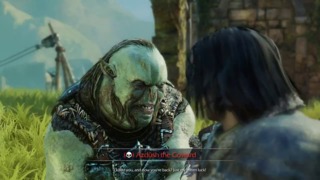
The way the nemesis system is so thoroughly implemented into everything you do makes Shadow of Mordor feel like the first big open world action game I’ve played that truly justifies having an open world; I can’t imagine this system working any other way. You are a part of this world and its ever evolving social structure, and the way the player is so integral to it all creates a highly tailored, personal narrative for everyone. While the game has a guiding plot in the background, it’s one I mostly ignored, and is clearly secondary to the player driven story that occurs on the world map between you and all the orc leaders. The way open world games traditionally force lengthy, “closed” stories into these large, presumably “open” worlds has always felt incongruous to me. Shadow of Mordor’s nemesis system shines a light on an area where open world games could have way more potential than we’ve seen thus far, and is a much richer experience for it.
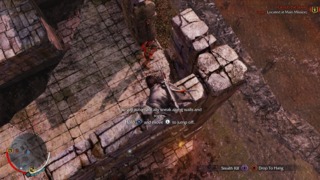
For all the cool things the nemesis system brings to the table, it would all be a wash if Shadow of Mordor didn’t play as well as it does. My other big gripe about open world games (past the poor use of the open world), has always been that they’re usually substandard action games from a mechanical sense. You know, jack of all trades and master of none. Shadow of Mordor doesn’t have that problem, as it’s a joy to play in every facet of its gameplay. The combat system is straight up Batman: Arkham style, which works just as well here. The stealth is also very reminiscent of the Arkham games; it’s simple and straightforward, yet more intuitive and satisfying than many full blown stealth games I’ve played. I had a lot of fun slinking around orc outposts, stealthily killing unaware orcs, only to engage in large, equally fun brawls if detected. You also have a handy bow with you, which I used as much as anything, and there’s plenty of room to cause some enjoyable chaos too. Similar to recent Far Cry games, you’re able to unleash beasts into enemy camps, and you can also engage with explosives, bee hives, and plenty other hazards littered around. There’s a surprising amount of things to interact with, and it all controls incredibly well while you’re doing it. Even the basic traversal feels heads and shoulders above similar games, allowing you to quickly and smoothly maneuver all over the place. Whether you’re speeding across the map at a surprisingly snappy pace, or swiftly climbing any of the game’s elaborate structures, there’s a refreshing responsiveness to your character’s movement. Nothing about the way Shadow of Mordor plays ever got in my way or frustrated me in the slightest; I’ve never been able to say that about an open world action game before.
It’s hard to fully convey in words, but the proficiency of the nuts and bolts of every facet of Shadow of Mordor’s gameplay is real, and even without the nemesis system it would make this a fantastic game; it may even be my favorite open world action game based on its play mechanics alone. Everything just clicks as it should, and even more impressive is that it all works that well in spite of there being so much of it. This is a busy game with a lot of moving parts, and there are a lot of ways it could crumble under its own weight, but never does. That’s in large part due to how impressively intuitive the mechanics are, but the pace of the game helps out as well. The story missions do a good job at focusing on introducing and using all the mechanics, rather than try and conjure up silly set piece moments that never work as well as the normal gameplay. That’s what usually makes the story missions the worst parts of open world games for me, and while they aren’t the best part of Shadow of Mordor, I enjoyed them. Past the story missions, virtually all of the side missions are totally fun and worth doing, and you’re free to tackle them as you see fit right from the start.
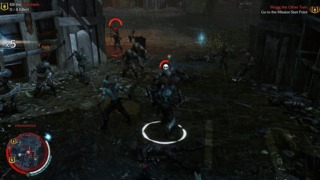
There’s a really great sense of progression to Shadow of Mordor, not only in the mission structure, but also in regards to Talion’s skills. The game starts out being surprisingly tough for an open world game, if not actually “hard”. It’s easy to stumble into an encounter that’s over your head, and this does two things. First, it increases the chance of death, which feeds right into the nemesis system in some cool ways. Shadow of Mordor is one of the few games that implements player death in a thoughtful way that doesn’t break the narrative, and its difficulty seems balanced to take advantage of that. Second, and more importantly, it forces you to consider every tool in your wide arsenal. A lot of games give you a lot of abilities to use, but most of them end up feeling unnecessary. This is the rare game where there’s no such waste, with every ability you gain having its place, and the difficulty of the game (along with the encounter and environment design) gives you ample opportunities and incentive to use them all. This becomes amplified as the game goes on, and you level up and get more skills. The new skills you acquire are exciting and powerful, and more importantly they give you a lot of additional functionality, rather than just make you stronger by the numbers. This makes leveling up and progressing through the skill tree a delight, and while I think these skills do make the game a little easier as you acquire more of them, it never becomes trivial. The encounters only get bigger and hairier, continually forcing you to apply your ever expanding skillset to new, interesting situations. It’s incredibly satisfying, and there aren’t many action games that handle player progression better than Shadow of Mordor.
If you couldn’t tell by now, I like Shadow of Mordor a lot, and I think it does two important things that all great video games do. First, it brings together the best parts of similar games that came before it, and goes on to assemble and execute those parts drastically better than its inspirations. Second, it introduces a great new idea (in this case, the nemesis system) that will, in all likelihood, become a new standard in the genre. That combination of looking back and perfecting existing standards, along with looking forward to set new ones, is a rare and impressive thing. Shadow of Mordor pulls it off, and manages to be a hell of a lot of fun too.
Looking Ahead to January
December was such a blur (like the rest of the fall for me) that I haven’t really looked ahead to 2015 yet. In terms of new video game releases, I believe Dying Light is the only one that’s caught my eye for January. Realistically though, my time this month will be spent between school duties and catching up on the 2014 games I missed. Right now that’s primarily a laundry list of smaller games I’ve picked up in recent Steam sales. I’ve already started playing This War of Mine, and The Vanishing of Ethan Carter, Always Sometimes Monsters, Crypt of the Necrodancer, Fract OSC, and The Wolf Among Us are all ready and waiting. There are plenty of longer games from 2014 I’d like to get to someday (Divinity: Original Sin, The Evil Within, and Dragon Age: Inquisition chief among them), and I have other backlog ideas as always, but I’m not going to overextend my reach until I see how this semester goes. I had my break, and made good use of it, but it’s back to the grind for now; longer games will have to wait once more.
